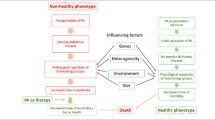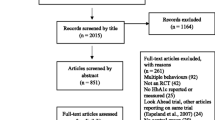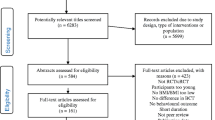Abstract
Purpose
This study explored whether sociodemographic and health-related characteristics moderated mHealth PA intervention effects on total and moderate-to-vigorous physical activity (MVPA) at 6 months, relative to a self-help condition among young adult cancer survivors (YACS).
Methods
We conducted exploratory secondary analyses of data from a randomized controlled trial among 280 YACS. All participants received digital tools; intervention participants also received lessons, adaptive goals, tailored feedback, text messages, and Facebook prompts. Potential moderators were assessed in baseline questionnaires. PA was measured at baseline and 6 months with accelerometers. Linear model repeated measures analyses examined within- and between-group PA changes stratified by levels of potential moderator variables.
Results
Over 6 months, the intervention produced MVPA increases that were ≥ 30 min/week compared with the self-help among participants who were males (28.1 vs. -7.7, p = .0243), identified with racial/ethnic minority groups (35.2 vs. -8.0, p = .0006), had baseline BMI of 25–30 (25.4 vs. -7.2, p = .0034), or stage III/IV cancer diagnosis (26.0 vs. -6.8, p = .0041). Intervention participants who were ages 26–35, college graduates, married/living with a partner, had a solid tumor, or no baseline comorbidities had modest MVPA increases over 6 months compared to the self-help (ps = .0163-.0492). Baseline characteristics did not moderate intervention effects on total PA.
Conclusions
The mHealth intervention was more effective than a self-help group at improving MVPA among subgroups of YACS defined by characteristics (sex, race, BMI, cancer stage) that may be useful for tailoring PA interventions.
Implications for cancer survivors
These potential moderators can guide future optimization of PA interventions for YACS.
ClinicalTrials.gov identifier
NCT03569605.

Similar content being viewed by others
Data availability
The data that support the findings of this study are available from the corresponding author upon reasonable request.
References
Miller KD, Fidler-Benaoudia M, Keegan TH, Hipp HS, Jemal A, Siegel RL. Cancer statistics for adolescents and young adults, 2020. CA Cancer J Clin. 2020;70(6):443–59. https://doi.org/10.3322/caac.21637.
National Institutes of Health. Cancer Stat Facts: Cancer Among Adolescents and Young Adults (AYAs) (Ages 15–39). National Cancer Institute Surveillance, Epidemiology, and End Results (SEER) Program. Accessed March 25. 2023. https://seer.cancer.gov/statfacts/html/aya.html.
Pugh G, Hough RE, Gravestock HL, Jackson SE, Fisher A. The health behavior information needs and preferences of teenage and young adult cancer survivors. J Adolesc Young Adult Oncol. 2017;6(2):318–26. https://doi.org/10.1089/jayao.2016.0089.
Adams SC, Petrella A, Sabiston CM, et al. Preferences for exercise and physical activity support in adolescent and young adult cancer survivors: a cross-sectional survey. Support Care Cancer. 2021;29(7):4113–27. https://doi.org/10.1007/s00520-020-05897-w.
Campbell KL, Winters-Stone KM, Wiskemann J, et al. Exercise guidelines for Cancer survivors: Consensus Statement from International Multidisciplinary Roundtable. Med Sci Sports Exerc. 2019;51(11):2375–90. https://doi.org/10.1249/MSS.0000000000002116.
Adams SC, Herman J, Lega IC, et al. Young Adult Cancer Survivorship: recommendations for patient Follow-up, Exercise Therapy, and Research. JNCI Cancer Spectr. 2021;5(1). https://doi.org/10.1093/jncics/pkaa099.
Brunet J, Wurz A, Shallwani SM. A scoping review of studies exploring physical activity among adolescents and young adults diagnosed with cancer. Psychooncology. 2018;27(8):1875–88. https://doi.org/10.1002/pon.4743.
Bélanger LJ, Mummery WK, Clark AM, Courneya KS. Effects of targeted print materials on physical activity and quality of life in young adult cancer survivors during and after treatment: an exploratory randomized controlled trial. J Adolesc Young Adult Oncol. 2014;3(2):83–91. https://doi.org/10.1089/jayao.2013.0021.
Rabin C, Dunsiger S, Ness KK, Marcus BH. Internet-based physical activity intervention targeting young adult cancer survivors. J Adolesc Young Adult Oncol. 2011;1(4):188–94.
Rabin C, Pinto B, Fava J. Randomized trial of a physical activity and meditation intervention for young adult cancer survivors. J Adolesc Young Adult Oncol. 2016;5(1):41–7. https://doi.org/10.1089/jayao.2015.0033.
Valle CG, Tate DF, Mayer DK, Allicock M, Cai J. A randomized trial of a Facebook-based physical activity intervention for young adult cancer survivors. J Cancer Surviv. 2013;7(3):355–68. https://doi.org/10.1007/s11764-013-0279-5.
Johnson AM, Baker KS, Haviland MJ, et al. A pilot randomized controlled trial of a fitbit- and Facebook-based physical activity intervention for Young Adult Cancer survivors. J Adolesc Young Adult Oncol. October 2021;22. https://doi.org/10.1089/jayao.2021.0056.
Wurz A, Brunet J. Exploring the feasibility and acceptability of a mixed-methods pilot randomized controlled trial testing a 12-week physical activity intervention with adolescent and young adult cancer survivors. Pilot Feasibility Stud. 2019;5:154. https://doi.org/10.1186/s40814-019-0530-6.
Buffart LM, Newton RU, Chinapaw MJ, et al. The effect, moderators, and mediators of resistance and aerobic exercise on health-related quality of life in older long-term survivors of prostate cancer. Cancer. 2015;121(16):2821–30. https://doi.org/10.1002/cncr.29406.
Kalter J, Buffart LM, Korstjens I, et al. Moderators of the effects of group-based physical exercise on cancer survivors’ quality of life. Support Care Cancer. 2015;23(9):2623–31. https://doi.org/10.1007/s00520-015-2622-z.
Courneya KS, McKenzie DC, Mackey JR, et al. Moderators of the effects of exercise training in breast cancer patients receiving chemotherapy: a randomized controlled trial. Cancer. 2008;112(8):1845–53. https://doi.org/10.1002/cncr.23379.
Courneya KS, Sellar CM, Stevinson C, et al. Moderator effects in a randomized controlled trial of exercise training in lymphoma patients. Cancer Epidemiol Biomarkers Prev. 2009;18(10):2600–7. https://doi.org/10.1158/1055-9965.EPI-09-0504.
Steindorf K, Schmidt ME, Klassen O, et al. Randomized, controlled trial of resistance training in breast cancer patients receiving adjuvant radiotherapy: results on cancer-related fatigue and quality of life. Ann Oncol. 2014;25(11):2237–43. https://doi.org/10.1093/annonc/mdu374.
Dieli-Conwright CM, Fox FS, Tripathy D, et al. Hispanic ethnicity as a moderator of the effects of aerobic and resistance exercise on physical fitness and quality-of-life in breast cancer survivors. J Cancer Surviv. 2021;15(1):127–39. https://doi.org/10.1007/s11764-020-00918-3.
Speck RM, Gross CR, Hormes JM, et al. Changes in the body image and relationship scale following a one-year strength training trial for breast cancer survivors with or at risk for lymphedema. Breast Cancer Res Treat. 2010;121(2):421–30. https://doi.org/10.1007/s10549-009-0550-7.
Dieli-Conwright CM, Sweeney FC, Courneya KS, et al. Hispanic ethnicity as a moderator of the effects of aerobic and resistance exercise in survivors of breast cancer. Cancer. 2019;125(6):910–20. https://doi.org/10.1002/cncr.31879.
Griffith K, Wenzel J, Shang J, Thompson C, Stewart K, Mock V. Impact of a walking intervention on cardiorespiratory fitness, self-reported physical function, and pain in patients undergoing treatment for solid tumors. Cancer. 2009;115(20):4874–84. https://doi.org/10.1002/cncr.24551.
Pinto B, Stein K, Dunsiger S. Peer mentorship to promote physical activity among cancer survivors: effects on quality of life. Psychooncology June. 2015;25. https://doi.org/10.1002/pon.3884.
Schleicher E, McAuley E, Courneya KS, et al. Moderators of physical activity and quality of life response to a physical activity intervention for breast cancer survivors. Support Care Cancer. 2022;31(1):53. https://doi.org/10.1007/s00520-022-07477-6.
Speck RM, Courneya KS, Mâsse LC, Duval S, Schmitz KH. An update of controlled physical activity trials in cancer survivors: a systematic review and meta-analysis. J Cancer Surviv. 2010;4(2):87–100.
Turner RR, Steed L, Quirk H, et al. Interventions for promoting habitual exercise in people living with and beyond cancer. Cochrane Database Syst Rev. 2018;9(9):CD010192. https://doi.org/10.1002/14651858.CD010192.pub3.
Rogers LQ, Courneya KS, Carter SJ, et al. Effects of a multicomponent physical activity behavior change intervention on breast cancer survivor health status outcomes in a randomized controlled trial. Breast Cancer Res Treat. 2016;159(2):283–91. https://doi.org/10.1007/s10549-016-3945-2.
Pinto BM, Dunsiger SI, Kindred MM, Mitchell S. Peer mentoring for physical activity adoption and maintenance among breast cancer survivors: moderators of physical activity outcomes. J Cancer Surviv January. 2022;7. https://doi.org/10.1007/s11764-021-01162-z.
Bennett JA, Lyons KS, Winters-Stone K, Nail LM, Scherer J. Motivational interviewing to increase physical activity in long-term cancer survivors: a randomized controlled trial. Nurs Res. 2007;56(1):18–27. https://doi.org/10.1097/00006199-200701000-00003.
Mama SK, Song J, Ortiz A, et al. Longitudinal social cognitive influences on physical activity and sedentary time in hispanic breast cancer survivors. Psychooncology. 2017;26(2):214–21. https://doi.org/10.1002/pon.4026.
Valle CG, Diamond MA, Heiling HM, et al. Effect of an mHealth intervention on physical activity outcomes among young adult cancer survivors: the IMPACT randomized controlled trial. Cancer. 2023;129(3):461–72. https://doi.org/10.1002/cncr.34556.
Valle CG, Pinto BM, LaRose JG, et al. Promoting physical activity in young adult cancer survivors using mHealth and adaptive tailored feedback strategies: design of the improving physical activity after Cancer Treatment (IMPACT) randomized controlled trial. Contemp Clin Trials. 2021;103:106293. https://doi.org/10.1016/j.cct.2021.106293.
Valle CG, Diamond MA, Heiling HM, et al. Physical activity maintenance among young adult cancer survivors in an mHealth intervention: twelve-month outcomes from the IMPACT randomized controlled trial. Cancer Med. June 2023;14. https://doi.org/10.1002/cam4.6238.
Valle CG, Camp LN, Diamond M, et al. Recruitment of young adult cancer survivors into a randomized controlled trial of an mHealth physical activity intervention. Trials. 2022;23(1):254. https://doi.org/10.1186/s13063-022-06148-5.
Evenson KR, Terry JW. Assessment of differing definitions of accelerometer nonwear time. Res Q Exerc Sport. 2009;80(2):355–62. https://doi.org/10.1080/02701367.2009.10599570.
Choi L, Ward SC, Schnelle JF, Buchowski MS. Assessment of wear/nonwear time classification algorithms for triaxial accelerometer. Med Sci Sports Exerc. 2012;44(10):2009–16. https://doi.org/10.1249/MSS.0b013e318258cb36.
Troiano RP, Berrigan D, Dodd KW, Mâsse LC, Tilert T, McDowell M. Physical activity in the United States measured by accelerometer. Med Sci Sports Exerc. 2008;40(1):181–8. https://doi.org/10.1249/mss.0b013e31815a51b3.
Piercy KL, Troiano RP, Ballard RM, et al. The physical activity guidelines for americans. JAMA. 2018;320:2020–8. https://doi.org/10.1001/jama.2018.14854.
Ware JE, Kosinski M, Turner-Bowker DM, Gandek B. User’s manual for the SF-36v2 Health Survey: second edition. Linc RI: QualityMetric Incorporated. 2007.
Reulen RC, Zeegers MP, Jenkinson C, et al. The use of the SF-36 questionnaire in adult survivors of childhood cancer: evaluation of data quality, score reliability, and scaling assumptions. Health Qual Life Outcomes. 2006;4:77. https://doi.org/10.1186/1477-7525-4-77.
Pranikoff S, Ayer Miller VL, Heiling H, et al. Frail young adult cancer survivors experience poor health-related quality of life. Cancer. 2022;128(12):2375–83. https://doi.org/10.1002/cncr.34196.
Singh B, Spence RR, Sandler CX, Tanner J, Hayes SC. Feasibility and effect of a physical activity counselling session with or without provision of an activity tracker on maintenance of physical activity in women with breast cancer - A randomised controlled trial. J Sci Med Sport. 2020;23(3):283–90. https://doi.org/10.1016/j.jsams.2019.09.019.
Hair BY, Hayes S, Tse C-K, Bell MB, Olshan AF. Racial differences in physical activity among breast cancer survivors: implications for breast cancer care. Cancer. 2014;120(14):2174–82. https://doi.org/10.1002/cncr.28630.
Berkman AM, Andersen CR, Tang K, Gilchrist SC, Roth ME. Disparities in physical activity in adolescent and young adult cancer survivors. J Cancer Surviv. 2023;17(3):848–58. https://doi.org/10.1007/s11764-022-01264-2.
Courneya KS, Segal RJ, Gelmon K, et al. Predictors of adherence to different types and doses of supervised exercise during breast cancer chemotherapy. Int J Behav Nutr Phys Act. 2014;11:85. https://doi.org/10.1186/s12966-014-0085-0.
Depenbusch J, Wiskemann J, Haussmann A, et al. Impact and determinants of structural barriers on physical activity in people with Cancer. Int J Behav Med. 2022;29(3):308–20. https://doi.org/10.1007/s12529-021-10014-0.
Romero SAD, Brown JC, Bauml JM, et al. Barriers to physical activity: a study of academic and community cancer survivors with pain. J Cancer Surviv. 2018;12(6):744–52. https://doi.org/10.1007/s11764-018-0711-y.
Naik H, Qiu X, Brown MC, et al. Socioeconomic status and lifestyle behaviours in cancer survivors: smoking and physical activity. Curr Oncol. 2016;23(6):e546–55. https://doi.org/10.3747/co.23.3166.
Schmidt ME, Wiskemann J, Ulrich CM, Schneeweiss A, Steindorf K. Self-reported physical activity behavior of breast cancer survivors during and after adjuvant therapy: 12 months follow-up of two randomized exercise intervention trials. Acta Oncol. 2017;56(4):618–27. https://doi.org/10.1080/0284186X.2016.1275776.
Steindorf K, Depenbusch J, Haussmann A, et al. Change patterns and determinants of physical activity differ between breast, prostate, and colorectal cancer patients. Support Care Cancer. 2020;28(7):3207–18. https://doi.org/10.1007/s00520-019-05097-1.
Bélanger LJ, Plotnikoff RC, Clark AM, Courneya KS. Determinants of physical activity in young adult cancer survivors. Am J Health Behav. 2012;36(4):483–94. https://doi.org/10.5993/AJHB.36.4.5.
Munoz AR, Kaiser K, Yanez B, et al. Cancer experiences and health-related quality of life among racial and ethnic minority survivors of young adult cancer: a mixed methods study. Support Care Cancer. 2016;24(12):4861–70. https://doi.org/10.1007/s00520-016-3340-x.
Grimmett C, Corbett T, Brunet J, et al. Systematic review and meta-analysis of maintenance of physical activity behaviour change in cancer survivors. Int J Behav Nutr Phys Act. 2019;16(1):37. https://doi.org/10.1186/s12966-019-0787-4.
Gooding HC, Gidding SS, Moran AE, et al. Challenges and opportunities for the prevention and treatment of cardiovascular disease among young adults: report from a national heart, lung, and blood institute working group. J Am Heart Assoc. 2020;9(19):e016115. https://doi.org/10.1161/JAHA.120.016115.
Wu YP, Yi J, McClellan J, et al. Barriers and facilitators of healthy diet and exercise among adolescent and young adult cancer survivors: implications for behavioral interventions. J Adolesc Young Adult Oncol. 2015;4(4):184–91. https://doi.org/10.1089/jayao.2015.0028.
Adamovich T, Watson R, Murdoch S, et al. Barriers and facilitators to physical activity participation for child, adolescent, and young adult cancer survivors: a systematic review. J Cancer Surviv June. 2022;4. https://doi.org/10.1007/s11764-022-01217-9.
Love C, Sabiston CM. Exploring the links between physical activity and posttraumatic growth in young adult cancer survivors. Psycho-oncology. 2011;20(3):278–86.
Rodríguez-Cañamero S, Cobo-Cuenca AI, Carmona-Torres JM, et al. Impact of physical exercise in advanced-stage cancer patients: systematic review and meta-analysis. Cancer Med. 2022;11(19):3714–27. https://doi.org/10.1002/cam4.4746.
Gildea GC, Spence RR, Jones TL, et al. Barriers, facilitators, perceptions and preferences influencing physical activity participation, and the similarities and differences between cancer types and treatment stages - a systematic rapid review. Prev Med Rep. 2023;34:102255. https://doi.org/10.1016/j.pmedr.2023.102255.
Acknowledgements
We are grateful for the valuable contributions of study team members, including Dr. Donald Rosenstein, Karen Hatley, Dr. Kristen Polzien, Dr. Lindsey Camp, Erin Coffman, Susanna Choi, Kayla Warechowski, and Miriam Chisholm. We thank Lauren Lux, Dr. Andrew Smitherman, Dr. Eliza Park, Dr. Allison Lazard, and community-based organizations that helped with study recruitment. We gratefully acknowledge the young adult cancer survivors who participated in the study.
Funding
This work was supported by the National Cancer Institute (R01CA204965 to CGV); the UNC Connected Health Applications & Interventions Core [funded through the UNC Nutrition Obesity Research Center (National Institute of Diabetes and Digestive and Kidney Diseases-funded; P30DK056350) and the Lineberger Comprehensive Cancer Center (National Cancer Institute-funded; P30 CA016086)]; the UNC Health Registry (funded in part by the UNC Lineberger Comprehensive Cancer Center’s University Cancer Research Fund; and the National Center for Advancing Translational Sciences (UL1TR002489, supporting REDCap and UNC Carolina Data Warehouse for Health).
Author information
Authors and Affiliations
Contributions
Conceptualization: CGV, CMR, DFT; Data curation: DPH, BTN; Formal analysis: HHH, AMD, DPH, BTN; Funding acquisition: CGV, CMR, BMP, JGL, DFT; Investigation: CGV, MAD, BTN; Methodology: CGV, HHH, AMD, DPH, BMP, JGL, DFT; Project administration: CGV, MAD, BTN; Supervision: CGV; Validation: MAD, DPH, BTN; Visualization: CGV, HHH, AMD; Writing – original draft: CGV, HHH, AMD; Writing – review & editing: CGV, HHH, AMD, MAD, DPH, BTN, CMR, BMP, JGL, DFT.
Corresponding author
Ethics declarations
Ethics approval
All procedures were approved by the University of North Carolina at Chapel Hill Oncology Protocol Review Committee (LCCC1707) and Institutional Review Board (#16-3409) and performed in accordance with the ethical standards of the institutional and/or national research committee and with the 1964 Helsinki Declaration and its later amendments or comparable ethical standards.
Informed consent
Informed consent was obtained from all individual participants included in the study.
Competing interests
The authors have no relevant financial or non-financial interests to disclose.
Additional information
Publisher’s Note
Springer Nature remains neutral with regard to jurisdictional claims in published maps and institutional affiliations.
Electronic supplementary material
Below is the link to the electronic supplementary material.
Rights and permissions
Springer Nature or its licensor (e.g. a society or other partner) holds exclusive rights to this article under a publishing agreement with the author(s) or other rightsholder(s); author self-archiving of the accepted manuscript version of this article is solely governed by the terms of such publishing agreement and applicable law.
About this article
Cite this article
Valle, C.G., Heiling, H.M., Deal, A.M. et al. Examining sociodemographic and health-related characteristics as moderators of an mHealth intervention on physical activity outcomes in young adult cancer survivors. J Cancer Surviv (2024). https://doi.org/10.1007/s11764-024-01577-4
Received:
Accepted:
Published:
DOI: https://doi.org/10.1007/s11764-024-01577-4




